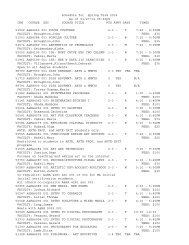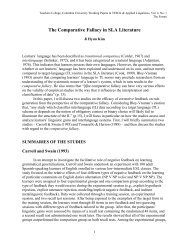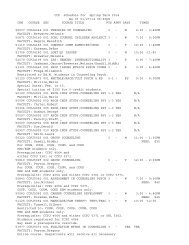UNICEF Mongolia - Teachers College Columbia University
UNICEF Mongolia - Teachers College Columbia University
UNICEF Mongolia - Teachers College Columbia University
You also want an ePaper? Increase the reach of your titles
YUMPU automatically turns print PDFs into web optimized ePapers that Google loves.
CHAPTER 2: THE TEACHING WORKFORCE<br />
1<br />
2<br />
3<br />
4<br />
5<br />
6<br />
TEACHERS IN MONGOLIA: AN EMPIRICAL STUDY ON RECRUITMENT INTO TEACHING,<br />
PROFESSIONAL DEVELOPMENT, AND RETENTION OF TEACHERS<br />
38<br />
Teacher training instuons provide credit-bearing courses for higher educaon graduates who<br />
teach without a proper teacher educaon degree. This “specializaon conversion” training consists<br />
of specialized courses in teaching methods or didaccs. Like any new teacher, these teachers have to<br />
undergo a cerficaon process and only receive the teaching license aer one year, when the course<br />
work in didaccs has been completed and the teacher has gained experience in teaching the parcular<br />
subject(s). The same procedure applies for teachers who wish to change their area of specializaon; that<br />
is, they have to enroll in didaccs courses in the parcular subject(s) and also teach the new subject(s) at<br />
least for one year before geng licensed in the new subject(s). 14<br />
Table 8: Primary and Secondary School <strong>Teachers</strong> by Subject Area in 2010/2011<br />
Subject Total Subject Total Subject Total<br />
Primary school subjects 9,059<br />
<strong>Mongolia</strong>n language &<br />
literature<br />
2,039 Kazakh language 53<br />
Russian language 710 English language 2,130 Russian & English 458<br />
Other foreign language 190 Computer & informaon 543 Math 1,672<br />
Math & informacs 282 Math & physics 285 Physics 749<br />
Chemistry 560 Chemistry & biology 350 Biology 622<br />
History 444 History & social study 728 Social study 220<br />
History & geography 169 Geography 546 Physical educaon 1,698<br />
Music 764 Arts and Dras 271 Drawing & technology 595<br />
Technology 963 Pedagogy & psychology 14 Defectology 30<br />
Speech correcon 9 Social worker 16 Other 189<br />
Source: Stascal Abstract (2011), Table 2.17.<br />
Total: 26,358<br />
The wide variety of subject teachers, manifested in Table 8, is somewhat confusing. These data do not<br />
reflect the qualificaons of teachers, but rather the subject(s) a teacher is teaching. At MSUE, for example,<br />
teachers are trained to teach two subjects (e.g., biology and chemistry). The excepon is math; math<br />
teachers are by training single-subject teachers. All other teachers trained at MSUE are licensed to teach<br />
two subjects even though they may end up, as Table 8 shows, teaching one subject only (the situaon<br />
may differ in other teacher training instuons). In 2006, MECS introduced a compelling five-year pilot<br />
project (MECS Ministerial Order #236) that prepared future natural science teachers in mulple science<br />
subjects. Apart from this pilot project that focused on subject areas or mul-subject teaching, teacher<br />
educaon students are typically trained to teach two subjects (again, with the excepon of math).<br />
Regionally, there is clearly a trend towards mul-subject, pre-service teacher educaon. As a result<br />
of curriculum reform throughout Europe, Caucasus, Central Asia and Asia, teachers in most countries<br />
now prepare for a subject area (e.g., natural sciences) rather than an individual subject (e.g., chemistry,<br />
physics, geography) with areas of specializaon within a subject. This enables teachers to easily change<br />
their subject specializaon over the course of their career. Mul-subject preparaon is also advantageous<br />
for the educaonal sector, as it enables schools to hire teachers who are qualified and licensed to teach<br />
several subjects. As a result of mul-subject pre-service teacher educaon, teachers do not have to teach<br />
14 For details, see Ministerial Order #74, November 13, 2008, Ministry of Educaon, Culture and Science of <strong>Mongolia</strong>, secon<br />
2.5.



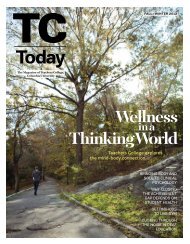
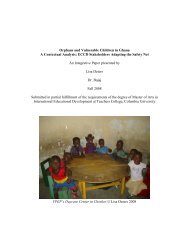
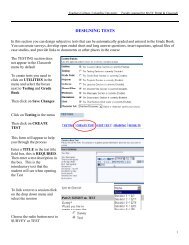
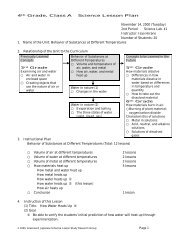
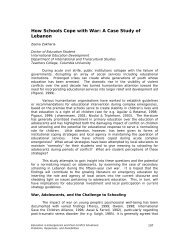

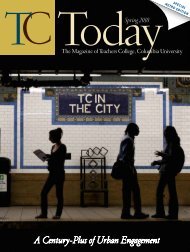
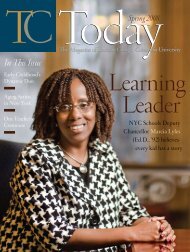
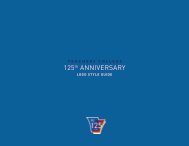

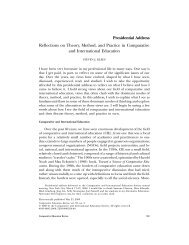
![TC Tod[...].pdf - Teachers College Columbia University](https://img.yumpu.com/27074883/1/190x252/tc-todpdf-teachers-college-columbia-university.jpg?quality=85)
